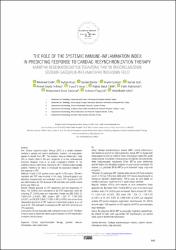The role of the systemic immune-inflammation index in predicting response to cardiac resynchronization therapy

View/
Access
info:eu-repo/semantics/openAccessDate
2022Author
Çelik, MehmetKüp, Ayhan
Demir, Serdar
Gülşen, Kamil
İzci, Servet
Yılmaz, Ahmet Seyda
Yılmaz, Yusuf
Çelik, Fatma Betül
Kahraman, Fatih
Tanırcan, Muhammed Raşit
Metadata
Show full item recordCitation
Çelik, M., Küp, A., Demir, S., Gülşen, K., İzci, S., Yılmaz, A.S., Yılmaz, Y., Çelik, F.B., Kahraman, F. & Tanırcan, M.R. (2022). The Role of the Systemic Immune-Inflammation Index in Predicting Response to Cardiac Resynchronization Therapy. Çukurova Anestezi ve Cerrahi Bilimler Dergisi, 5(2), 145-154. https://doi.org/10.36516/jocass.1139629Abstract
Aim: Cardiac resynchronization therapy (CRT) is a reliable treatment
modality in patients with systolic dysfunction. However, not every patient
appears to benefit from CRT. The systemic immune inflammation index
(SII) is closely linked to the poor prognosis of various cardiovascular
disorders. However, there is no study investigating whether SII has
predictive value in determining response to CRT in dilated cardiomyopathy
patients. Therefore, we intend to investigate the association between SII
and response to CRT.
Methods: A total of 220 patients (mean age 61.2±10.8 years; 120 men)
implanted with CRT were involved in this study. Echocardiographic and
laboratory measurements were evaluated prior to CRT. Response to CRT
was determined as a≥ 15% decrease in left ventricular end-systolic volume
at one-year follow-up.
Results: Patients grouped as CRT responders and non-responders. Of
these, 143 (64.6%) were considered to be CRT responders, while the
remaining 77 (33.4%) were non-responders. Female sex (OR: 3.823, CI:
1.568-9.324 p=0.003), QRS duration (OR: 1.224, CI: 1.158-1.335
p<0.001), and SII (OR: 0.996 CI: 0.995-0.997 p<0.001) were shown to be
independent predictors of CRT response in multivariate analysis. A cut-off
value of SII >825 estimated no response to CRT with 80% sensitivity and
75% specificity.
Conclusions: SII was associated with unresponsiveness to CRT. Therefore,
it may be used to determine optimal patient selection for CRT implantation
in routine clinical practice. Amaç: Kardiyak resenkronizasyon tedavisi (KRT), sistolik disfonksiyonu
olan hastalarda güvenilir bir tedavi yöntemidir. Ancak, KRT'nin faydası belli
hasta grupları ile sınırlıdır. Sistemik immün inflamatuvar indeks (SII), çeşitli
kardiyovasküler bozuklukların kötü prognozu ile ilişkilidir. Bununla birlikte,
dilate kardiyomiyopati hastalarında SII'nin KRT'ye yanıtı belirlemede
prediktif değeri olup olmadığını araştıran bir çalışma bulunmamaktadır. Bu
nedenle, bu çalışmada SII ile KRT'ye yanıt arasındaki ilişkiyi araştırmak
amaçlandı.
Yöntemler: Bu çalışmaya KRT implante edilen toplam 220 hasta (ortalama
yaş 61,2±10,8 yıl; 120 erkek) dahil edildi. KRT öncesi ekokardiyografi ve
laboratuvar ölçümleri değerlendirildi. KRT'ye yanıt, bir yıllık takipte sol
ventrikül sistol sonu hacminde ≥ %15 azalma olarak belirlendi.
Bulgular: Hastalar, KRT'ye yanıt verenler ve yanıt vermeyenler olarak
gruplandırıldı. Bunlardan 143'ü (%64,6) KRT'ye yanıt veren olarak kabul
edilirken, kalan 77'si (%33,4) yanıt vermeyendi. Kadın cinsiyet (OR: 3.823,
CI: 1.568-9.324 p=0.003), QRS süresi (OR: 1.224, CI: 1.158-1.335
p<0.001) ve SII (OR: 0.996 CI: 0.995-0.997 p<0.001) çok değişkenli
analizde KRT yanıtının bağımsız öngörücüleri olarak bulundu. SII >825'lik
bir sınır değeri, %80 duyarlılık ve %75 özgüllük ile KRT'ye yanıt olmadığını
öngördürmüştür.
Sonuç: Bu çalışmada SII’nin KRT'ye yanıtsızlığı öngördüğü gösterilmiştir.
Bu nedenle SII rutin klinik uygulamada KRT implantasyonu için optimal
hasta seçimini belirlemede kullanılabilir.

















